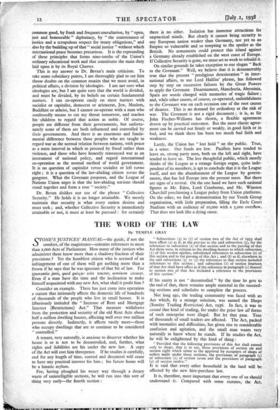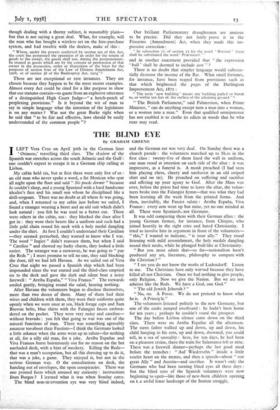THE WORD OF THE LAW
By TEMPLE GRAY
STONE'S JUSTICES' MANUAL—the guide, if not the comfort, of the magistrates—contains references to more titan 2,000 Acts of Parliament. How many of the justices who administer them know more than a shadowy fraction of their provisions ? Yet the humblest citizen who is accused of an infringement of one of them will get nothing more than a frown if he says that he was ignorant of that bit of law. For ignorantia furls, quod quiscus scire tenetur, neminem excusat. Even if a man have the time and the inclination to make himself acquainted with any new Act, what shall it profit him ?
Consider an example. There has just come into operation a statute that intimately affects the domestic life of hundreds of thousands of the people who live in small houses. It is laboriously intituled the " Increase of Rent and Mortgage Interest (Restrictions) Act." That measure withdraws from the protection and security of the old Rent Acts about half a million dwelling houses, affecting well over two million persons directly. Indirectly, it affects vastly more—those who occupy dwellings that are to continue to be considered " controlled."
A tenant, very naturally, is anxious to discover whether his house is or is not to be decontrolled, and, further, what rights and liabilities are his under the new law. A copy of the Act will cost him threepence. If he studies it carefully, and for any length of time, control and decontrol will cease to have any practical interest for him ; his future home will be a lunatic asylum.
For, having ploughed his weary way through a dreary waste of unintelligible sections, he will run into this sort of thing very early—the fourth section : " Subsections (3) to (5) of section two of the Act of 1933 shall have effect (a) as if, in the proviso to the said subsection (5), for the references to subsection (2) of that section and to the passing of that Act there were, in relation to the dwelling-houses to which subsection (1) of this section applies, substituted references to subsection (2) of this section and to the passing of this Act ; and (b) as if, elsewhere in the said subsections (3) to (5) the references to that section included references to this section ; and subsection (t) of section fourteen of that Act shall have effect as if the reference in paragraph (c) thereof to section two of that Act included a reference to the provisions of this section."
If his sanity is not " decontrolled " by the time he gets to the end of that, there remains ample material in the succeed- ing sections and schedules to complete the process.
Not long ago, the trading community was faced with an Act which, by a strange solecism, was named the Shops (Sunday Trading Restriction) Act, 1936. In fact, it was to extend that kind of trading, for under the prior law all forms of such enterprise were illegal. But let that pass. Tens of thousands of small traders are affected. The Act, packed with anomalies and difficulties, has given rise to considerable confusion and agitation, and the small man wants very naturally to know where he stands. If he studies the Act, he will be enlightened by this kind of thing : " Provided that the following provisions of this Act shall extend only to shops, that is to say, those provisions of section six and section eight which relate to the approval by occupiers of shops of orders made under those sections, the provisions of paragraph (c) of subsection (t) of section seven and the provisions of paragraph (a) of section twelve.".
It is said that every other household in the land will be affected by the new hire-purchase law.
It is, therefore, most important that every one of us should understand it. Compared with some statutes, the Act, though dealing with a thorny subject, is reasonably plain— but that is not saying a great deal. What, for example, will the man who has bought a wireless set 'on the hire-purchase system, and had trouble with the dealers, make of this : " Where, under the powers conferred by section ten of this Act, the court has postponed the operation of an order for the return of goods to the owner, the goods shall not, during the postponement, be treated as goods which are by the consent or permission of that owner in the possession, order or disposition of the hirer for the purposes of section four of the Law of Distress Amendment Act, i9o8, or of section 38 of the Bankruptcy Act, 1914"?
These are not exceptional or rare instances. They are chosen because they happen to be the most recent examples. Almost every Act could be cited for a like purpose to show that our statutes contain—to quote from an explosive utterance of a distinguished High Court Judge—" a hotch-potch of perplexing provisions." Is it beyond the wit of man to say in simple language what the intention of the legislature is on any matter ? Was not the great Burke right when he said that " to be fair and effective, laws should be easily understanded of the common people "? Our brilliant Parliamentary draughtsmen are anxious to be precise. Did they not lately prove it in the Firearms (Amendment) Act, when they made this im- pressive correction : " In subsection (t) of section 13 for the word ' BOUGHT there shall be substituted the word ' PURCHASED " and in another enactment provided that " the expression ' bull ' shall be deemed to include cow " ?
There is no doubt that simpler language would substan- tially decrease the income of the Bar. What small fortunes, for instance, have been reaped from provisions such as that which brightened the pages of the Darlington Improvement Act, 1872 :
" The term ' new building' means any building pulled or burnt to, or within ten feet of, the surface of the adjoining ground "
" The British Parliament," said Palmerston, when Prime Minister, " can do anything except turn a man into a woman, or a woman into a man." Even that qualified omnipotence has not enabled it to clothe its edicts in words that he who runs may read.



















































 Previous page
Previous page